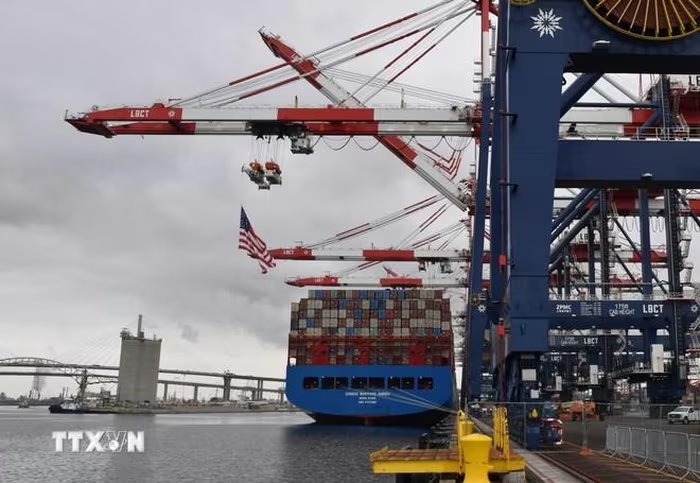China announces retaliation, imposing special port tax on US ships
Posted on: 13/10/2025

View of the cargo port in Tianjin, China. (Photo: THX/VNA)
On October 12, China's Ministry of Commerce announced that the country was forced to adopt retaliatory measures to protect its legitimate rights and interests after the United States insisted on imposing port tariffs on Chinese vessels.
The statement clarified: “The actions of the United States seriously violate the regulations of the World Trade Organization (WTO) as well as the principles of equality and reciprocity stipulated in the China-U.S. Maritime Transport Agreement, serving as a typical example of unilateralism.”
According to the Ministry of Commerce, China has repeatedly expressed dissatisfaction and firmly opposed this move. The statement emphasized: “China is compelled to implement retaliatory measures to safeguard its legitimate rights and interests.”
On October 10, China’s Ministry of Transport announced the imposition of a special port fee on U.S. vessels, effective from October 14. This measure will apply to ships owned or operated by American companies, as well as those registered or docked in the United States.
The Ministry of Transport affirmed that these measures were a response to Washington’s decision to impose port tariffs on Chinese ships. Back in April 2025, China’s Ministry of Commerce had warned that corresponding measures would be taken if the U.S. implemented such a policy.
The U.S. imposes an additional 100% tariff on Chinese goods
Earlier, on October 10, U.S. President Donald Trump announced that the U.S. would impose an additional 100% tariff on imports from China starting November 1—or sooner—a move that could raise tariffs to levels that previously sparked fears of a severe recession and financial turmoil back in April.
Trump stated on social media that this decision was made in response to China’s imposition of export controls on rare earth materials.
In another post on Truth Social, he wrote that there “seems to be no reason” to meet with Chinese President Xi Jinping during his upcoming visit to South Korea.

Cargo ships docked at the port in Los Angeles, California, USA. (Photo: THX/VNA)
In his post, Trump stated: “Starting from November 1, 2025 (or earlier, depending on China’s actions or further changes), the United States will impose a 100% tariff on China, in addition to current tariffs.”
This announcement, made after U.S. financial markets had closed, risks shaking the global economy.
Reviving the trade war originally initiated by Trump could paralyze trade between the world’s two largest economies, as the additional tariffs would stack upon the roughly 30% already applied to Chinese goods.
The tariff hike could further intensify domestic political pressure, fuel inflation amid a weakening labor market, and increase the risk of government employee layoffs due to budget gridlock.
President Trump also stated that the U.S. would respond by imposing its own export controls on “all critical software” produced by American companies.
According to observers, this could be a deterrent move ahead of negotiations or a retaliatory action that raises concerns about global economic stability.
Recently, the U.S. and China have sought to maintain trade negotiations after earlier tariff announcements reignited the trade war between the two nations.
Although both sides agreed to reduce tariffs following negotiations in Switzerland and the United Kingdom, tensions persist as China continues to restrict rare earth exports—an essential resource for many U.S. technologies.
Trump has not officially canceled his meeting with President Xi Jinping but implied that it “may not take place” during his upcoming Asia tour, which includes stops in Malaysia for the ASEAN Summit, Japan, and South Korea—where he was originally scheduled to meet Xi before the Asia-Pacific Economic Cooperation (APEC) Summit.
The post on Truth Social stated: “I was scheduled to meet President Xi in two weeks at APEC in South Korea, but now there seems to be no reason to do so.”